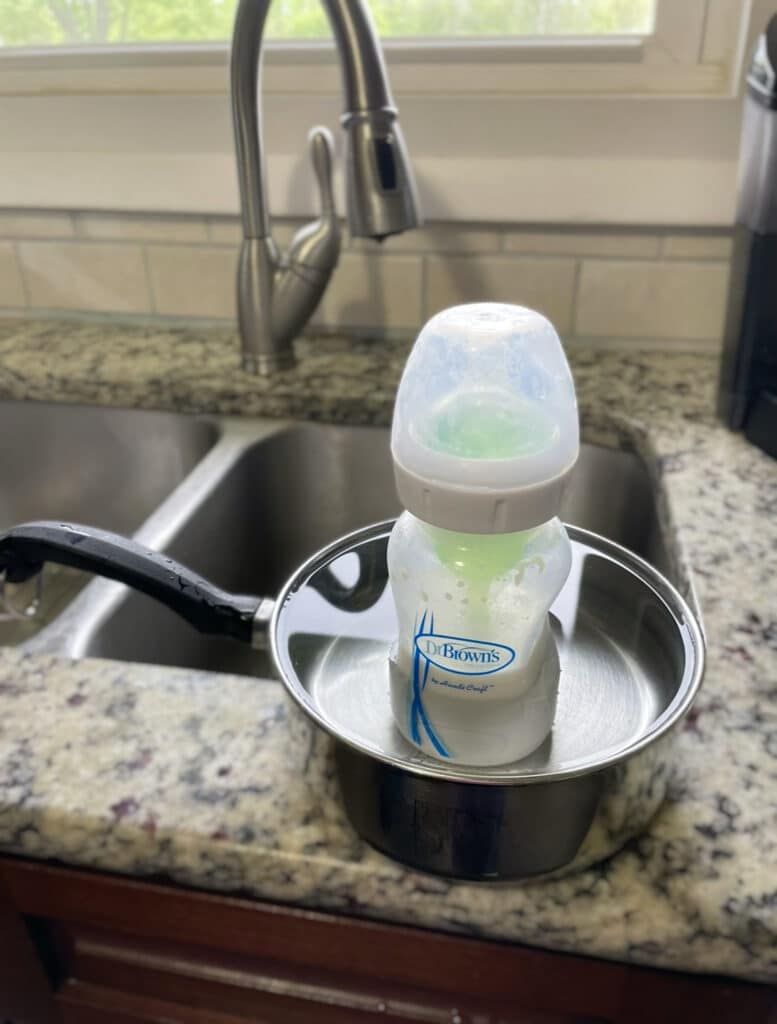Recently, we went to visit my parents with Baby Theo (and his bottles and diaper bag) in tow– a regular occurrence now that we live much closer to them. When it was time to feed Theo, my Mom took the bottle out of the fridge and pulled out the same pot she uses every time to heat the bottles to the correct temperature.
“You know,” she said to me, “This pot is the same pot I used for your bottles when you were a baby.”
“Wait, hold up. Mom, this pot is basically 40 years old and still being used??”
“Yup!” she said. “And it’s being used for your child now.”
My mind was completely blown. Here was my Mom, using the same pot she had used for almost 40 years. Meanwhile, my husband Will and I had probably replaced our pots at least three times in the 11 years we’ve been married.
Why is that? Why is my Mom able to use her pot for almost 4 decades, while we’ve had to replace ours every few years??

Here are three reasons why our material possessions aren’t lasting as long, and we are buying things more frequently:
1) Production priorities have shifted.
In her article “Your Stuff is Actually Worse Now: How the Cult of Consumerism Ushered in an Era of Badly Made Products,” Izzie Ramirez explains that when designing a product, designers have to take into account three aspects of the design: appearance (it looks good), functionality (it works the way it’s supposed to), and manufacturability (it’s able to be produced). In the past, a balance between all three was attempted. Now, the priorities have changed:
Design has shifted more toward manufacturability and appearance than functionality, when it should be a balance of all three. Arguably, it’s nearly impossible for corporations to avoid participating in the trend cycle as long as consumers have an appetite for more — whether it’s a predilection for cooler clothing or whatever new incremental yet buzzy technology just came out. At the same time, the blame does not lie on consumers’ shoulders; corporations are responsible for creating and stoking the “new and more is better” culture we have today.
Izzie Ramirez, “Your Stuff is Actually Worse Now”
In other words, the ability to make things faster and more cheaply has become more important than the product actually lasting or functioning the way it’s supposed to.
And because we have been urged by consumer culture to keep buying newer things, there is a vicious consumerism cycle in which we constantly buy things that are getting made more and more quickly and cheaply.
The result? Shoddy merchandise and cluttered living spaces. But we can choose to live differently.
2) Consumer culture has encouraged us to focus on quantity over quality.
As mentioned in #1, we are in a constant consumer cycle in which things are getting made cheaply and quickly, yet we are encouraged to keep buying these goods because it turns a profit. So, the cycle is perpetuated– we keep buying, and manufacturers continue to find ways to cut corners and produce goods faster and for less money, even when production costs are higher than they were previously. This means that, unless the cycle is broken, our stuff will continue to get worse over time.
But we can break this consumerism cycle.
3) Reusing something and/or buying gently used things isn’t typically considered.
Because consumer culture urges us to continue buying and consuming, other options aren’t immediately apparent. We are often able to reuse something by fixing or mending it. Buying something gently used rather than new can be an option as well, or even borrowing when a certain product is needed for a short time.
In the past, before I was a Christian minimalist, I thought buying or using something previously used was shameful or gross. Now, my family and I use previously used goods regularly, especially with Theo. For example: he’s going to grow out of his clothes in a couple of months anyway, so why should I always buy new clothes for him? Previously used baby clothes make up 95% of his wardrobe right now.
Want to live differently and break the vicious consumerism cycle?
Here are some ways we can be more intentional with reducing our purchases and living more minimally:
- Pay attention to quality goods, and whenever financially possible, buy small amounts of quality goods instead of buying a large amount of low-quality goods. Purchasing a smaller amount of quality products, rather than buying a lot of low-quality products, will serve us well for a longer amount of time, and reduce waste.
- Reuse, buy gently used goods, and borrow whenever possible. It’s easy to default to buying new products, since that is what we are urged to do by consumer culture. But we can reuse and borrow, or buy previously used goods instead.
- Consider the environmental impact of our purchases, and how God has called us to take care of God’s creation. Continuing to buy and consume at the levels that we currently do has already taken a toll on our earth. Buying and consuming more minimally is better for our planet, and for our health.
- Advocate for fair wages and better treatment for those who produce our goods. When a company’s priorities are producing products as cheaply and as quickly as possible, the wages and treatment of employees worsen exponentially. Advocate for a living wage and de-normalizing overwork, long hours, and hazardous work environments.
Turn my heart to your decrees and not to selfish gain.
Psalm 119:36
We are called by God to live into the abundant life Jesus came to give us (John 10:10) rather than the destructive abundance that beckons to us by consumer culture.
With God’s help, we can break the vicious consumerism cycle and use quality goods that function correctly. We can purchase from companies that aim to balance functionality, appearance, and manufacturability. We can buy less. We can prioritize quality over quantity. And we can reuse, borrow, and utilize previously used products.
How is God calling you to buy less and focus on God more?
Did you like this post? Check out the Christian Minimalism book!


6 Comments
John
October 2, 2023 - 8:15 amHave that same pot that was my mothers. Also have two wooden spoons that were her mothers and an orange set of Tupperware measuring cups (among other kitchen items) that I use all the time. Quality over quantity. Wisdom coed with age, I think?
Dianna Jackson
October 2, 2023 - 8:47 amI agree. We all need to start thinking of saving , not spending!
Larry Cooley
October 2, 2023 - 9:04 amEvery once in awhile, you write something that really connects the dots for me. I’m 70 years old. I remember my mother in law purchasing a Mercedes around 1974 ish. I thought she was nuts for paying that much for a car. She had that same car when she died, in 2006. Not advocating a car brand, but the fact she took care of it, maintained it, kept it clean and in good repair. It had excess of 300,000 miles on it. Still ran great. A life’s lesson for me, and I’ve kept the same tools, vehicles, clothes and personal items for decades as well. Thanks for doing your e mails.
AnnaMay
October 2, 2023 - 9:49 amI enjoyed reading your article! thank you for making the time to make and post it and get me thinking about how I can be more intentional with the things in my life! Glory to God! ❤️
Loretta
October 2, 2023 - 11:09 amMy husband and I have had this very conversation so many times! Things are just not built to last. I have decided to personally never buy new clothes (except socks and undergarments) and to instead buy clothes from Thrift Stores. I have the same policy when it comes to books. We also love our local Buy Nothing Group and Facebook Marketplace to get or buy gently used items as well as finding new homes for things we no longer need.
Ann C
October 5, 2023 - 1:50 pmI so related to this article. When I moved in with my parents to help care for them I noticed my mom was still using the pots and pans she used as I was growing up. After they passed and I inherited their home and its belongings I sold my home and much of its stuff and I still am cooking with her pots and pans now 75 years old. My dad had to replace a handle that melted over the fire when it wasn’t centered over the gas burner but otherwise they are still great!